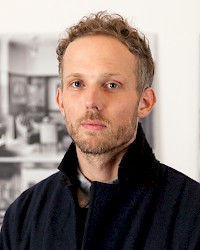Vita
Jeffrey Kirkwood is an Assistant Professor of Art History at the State University of New York in Binghamton. He received his PhD and MA from Princeton University, where he was a Harold W. Dodds Fellow, and an MA from the University of Chicago. In 2011 he was awarded a Fulbright Grant to Germany, where he was a Visiting Junior Fellow at the IKKM. He is the editor (along with Leif Weatherby) of the first English translation of Ernst Kapp’s Principles of a Philosophy of Technology, which will be published with University of Minnesota Press, and is currently writing a book about the visualization of counterfactuals in the late nineteenth and early twentieth centuries.
Dated from 2017
Field of research
Media theory and history, counterfactuality, early cinema, history of psychoanalysis.
IKKM Research Project
Subjunctive Engineering
In 1973 David Lewis claimed that “counterfactuals are notoriously vague,” but that their vagueness does not doom us to an unclear “account of their truth conditions” (Lewis, 1973). The challenge presented by attempts to understand the truth conditions of counterfactuals is that they are, by their very nature, non-empirical—the antecedent premise must be “counter” to facts, and thus cannot be proven true by any observable state in the world. At the same time, counterfactuals capture an essential operation of empirical science by allowing for the imagination of states that are not, or not yet, observable, and are therefore necessary for mapping terrains of possibility. By focusing primarily on Ernst Mach’s images of shockwaves and his writing on “thought experiments,” this project will examine how the operations of imaging technologies in the late nineteenth and early twentieth century helped to create a visual language for articulating states that were not empirically observable (Mach, 1906). Investigation of Mach’s role in discourses on counterfactuality is essential when one considers his status among artistic and cultural figures as the primary exponent of positivism. Generally understood, positivists insisted that only events and objects that could be empirically observed could be real, which was closely tied to the emergence of mechanical image-making techniques as the paradigmatic form of evidence. Detractors of positivism criticized what they called “Neo-Machism” as an impoverished understanding of realism that was transmitted to the arts from science and was an ideological product of “the bourgeoisie’s decay”—a kind of death of hermeneutics and interpretation (Lukács, 1932). This was in spite of Mach’s impact on both the “visual vocabulary for motion” among Futurists and his direct influence on figures such as his student Robert Musil (Weibel, 2005). What has remained unacknowledged is the ways in which Mach’s work on thought experiments was intimately bound to his work with photography, offering a bridge between positivism and a mechanical visual imaginary. With this in mind, one of the central questions the project seeks to answer is the extent to which the scientific and artistic “criterion of verisimilitude” for counterfactuality was determined by the visual conventions established by mechanical image-making technologies (Kuhn, 1977).
Selected Publications
Jeffrey Kirkwood and Leif Weatherby, Eds. "Principles of a Philosophy of Technology", by Ernst Kapp, Trans. Lauren K. Wolf. Minneapolis: University of Minnesota Press (Under Contract).
"The Cinema of Afflictions" (under review).
"Jimmy Roberts, Standards." Osmos Magazine, Issue 8 (March 2016).
"Tesla-Transformator." In Wörterbuch kinematographischer Objekte, edited by Marius Böttcher et al. Berlin: August Verlag, 2014.
Erich Hörl, “A Thousand Ecologies: The Process of Cyberneticization and General Ecology.” Translated by Jeffrey Kirkwood, James Burton, and Maria Vlotides. In The Whole Earth: California and the Disappearance of the Outside, edited by Diedrich Diederichsen and Anselm Franke, 121–30. Berlin: Sternberg Press, 2013.
"A Sweet Tooth and Some Cavities." Idiom (February 13, 2013).
"Good Future, Bad Future: On the Unauthenticated Avant-Garde", Jacobin,
(Summer 2011).
"Between Being and Otherwise: Lacunae, Lévinas, and the Threat of Totality." In Threat: Essays in French Literature, Thought and Culture, edited by Adam Kay and Georgina Evans, 197–216. Oxford: Peter Lang, 2010.
